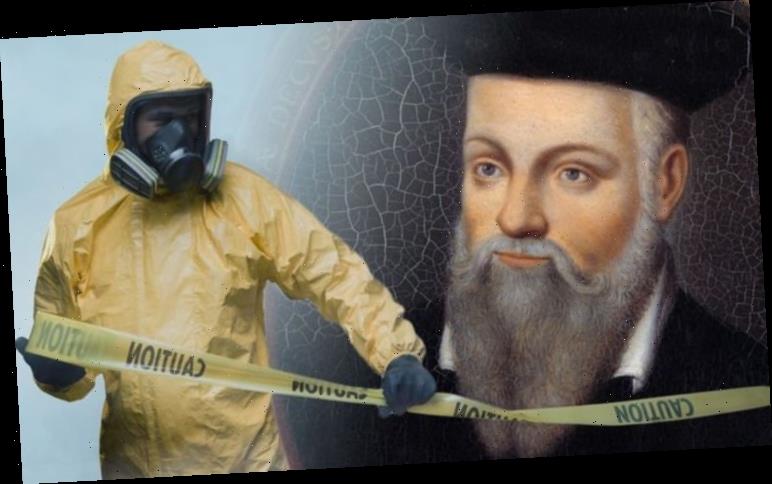The coronavirus disease (COVID-19) in China has surpassed the 2003 SARS epidemic. Coronavirus, which most likely spreads from animals to humans, was first detected in Wuhan City, Hubei province, last year.
The infection has since spread to nearly 30 countries outside of China, including nine cases UK, fuelling fears for humanity’s safety.
Coronavirus infections have been confirmed in France, Germany, Japan, the US, Australia, Singapore, Macau, Malaysia, Cambodia, Sri Lanka, the UAE, South Korea, Vietnam, Thailand, Canada and Nepal among others.
The World Health Organization (WHO) has dubbed the outbreak a global emergency but has not called it a pandemic just yet.
Some have even bizarrely claimed the 15th-century writer and supposed mystic Nostradamus predicted the outbreak of a “great plague” in the future.
Twitter user Marco Malacara said: “The antichrist leading the White House, locusts, floods, flies, coronavirus. I think this is what Nostradamus was telling us about 465 years ago.”
Another person tweeted in Spanish, which translated reads: “The plague of the 21st century has arrived. A Nostradamus prophecy. We will die very soon. #coronavirus”
READ MORE
-
Coronavirus cure: Coronavirus ‘spike’ protein just mapped
Did Nostradamus predict the coronavirus epidemic in China?
The Chinese viral outbreak began in December last year when a newly discovered strain of the coronavirus, Novel Coronavirus (2019-nCoV), was discovered in Wuhan.
The virus was initially traced to a busy seafood market and the number of infected has skyrocketed in January.
Coronavirus infections have since been confirmed in Thailand, France, Germany, Nepal, South Korea, Japan, Australia and the US.
Online conspiracy theorists have suggested the Michele de Nostradame, or Nostradamus, predicted the epidemic in the 15th century.
Nostradamus’ followers consider the man to be a powerful prophet and seer who predicted the Great Fire of London in 1666 and the rise of Adolf Hitler in 1933.
Nostradamus penned his supposed prophecies in the form of mystic passages known as quatrains.
The bulk of Nostradamus’ quatrains were published in 1555 in his magnum opus Les Propheties.
The great plague of the maritime city, Will not cease until there be avenged the death
Michele de Nostredame
One of these quatrains, Century 2:53, could be a reference to the coronavirus, according to online claims.
The passage reads: “The great plague of the maritime city
“Will not cease until there be avenged the death
“Of the just blood, condemned for a price without crime,
“Of the great lady outraged by pretence.”
DON’T MISS
Can you treat coronavirus? How dangerous is it? [INSIGHT]
How serious is the China virus epidemic? Will the virus spread? [INTERVIEW]
Can wearing a face mask protect you from catching coronavirus? [ANALYSIS]
READ MORE
-
Coronavirus: Chilling 40-year-old book PREDICTED Wuhan outbreak
Hubei Province is a landlocked part of eastern China, so it is unlikely Wuhan is the “maritime city” mention by Nostradamus.
The disease was, however, traced to a seafood market, which could be a loose link to the quatrain.
Nostradamus mentioned another plague in Century 2:56.
The passage reads: “One whom neither plague nor steel knew how to finish,
“Death on the summit of the hills struck from the sky:
“The abbot will die when he will see ruined
“Those of the wreck wishing to seize the rock.”
Should you believe any claims about Nostradamus prophecies?
According to Brian Dunning, the author of the Skeptoid podcast, Nostradamus’ predictions require a great deal of hindsight to link to world events.
Mr Dunning said Nostradamus’ writings are grossly misrepresented and not genuine forecasts of the future.
He said: “Nostradamus’ writings are exploited in a number of fallacious ways.
“Ambiguous and wrong translations, ‘creative’ interpretations, hoax writings, fictional accounts, and the breaking of non-existent codes within his quatrains all contribute to a vast body of work, all of it wrong, and many times the size of everything Nostradamus ever actually wrote.”
The sceptic added: “Michel de Nostredame was truly one of the brilliant lights of his day, but to subscribe to false stories and urban legends is to disrespect who the man actually was.
“Appreciate his contributions to medicine and Renaissance literature, and don’t trivialise his good works in favour of a pretended history of paranormal magical powers.”
Additional reporting from Maria Ortega.
Source: Read Full Article






